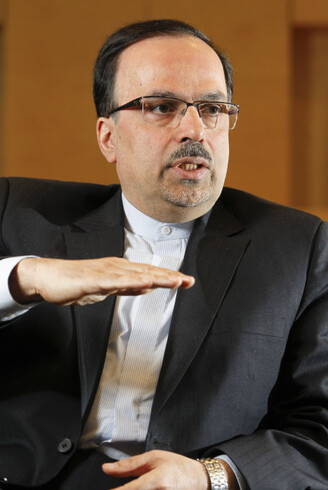hankyoreh
Links to other country sites 다른 나라 사이트 링크
Iranian ambassador speaks out against sanctions

By Cho Il-joon, Staff Writer
Iranian ambassador to South Korea Ahmad Masumifar stressed the peaceful goals of his country's nuclear program and the illegitimacy of western sanctions in an interview Wednesday with the Hankyoreh at the Iranian embassy in Seoul.
Masumifar also said the attempts by the US and Europe to impose Iranian crude oil import bans on other countries represented undue pressure on sovereign states and would backfire. While stating that he "knows about and understands the alliance between South Korea and the US," Masumifar said it was important for Seoul to "make a decision in the interests of its own people" regarding sanctions on Iran.
"For a particular country to impose an Iranian crude oil import ban on other countries goes against national sovereignty and independence," he added. "An independent state should not accept such pressure," Masumifar said. His remarks were apparently directed at a request for reductions in Iranian crude imports Tuesday from US State Department special adviser for Iran and North Korea sanctions Robert Einhorn during a visit to South Korea.
Noting that 2012 marks the 50th year of diplomatic relations between Seoul and Tehran, Masumifar also said the two countries "have engaged in exchange for a thousand years, and around 2,000 South Korean companies are in economic partnerships with Iran right now." He added, "The South Korean government and people are very intellectual and smart and I believe they will not accept demands for sanctions that are prejudicial to their own interests."
Masumifar also opined that the sanctions would have little effect, as Iran holds 7% of the world's energy resources in crude oil and natural gas. "Iran has the 16th largest economy in the world," Masumifar said. "Additional sanctions may hurt the Iranian economy in the short term, but in the long term they will actually promote the capabilities of the Iranian economy."
As a basis for this, he cited Iran's rich human and material resources, its solid economic ties to the international community, and its high rate of economic growth compared to western countries. In particular, Masumifar said, "The economic situation in Europe right now is serious, with negative growth, high unemployment, and inflation."
"The US and European economies may not be prepared for the effects additional sanctions on Iran would have," he added. Masumifar also said Iran's warnings about blocking the Strait of Hormuz were a response to western pressure, and that doing so does not accord with Iran's interests. In particular, he noted, "Some national security experts have said there are other aims behind the US's threat.
"The US is considering raising general tensions in the Strait of Hormuz and the Middle East in order to sell its weapons to Middle Eastern countries," he said. The western push for additional sanctions against Iran gained momentum after the International Atomic Energy Agency voiced suspicions about nuclear weapons development in a November 2011 report on the Iranian nuclear program. Masumifar raised questions about US influence on the report, saying, "Even in this report written by nuclear experts and a observer group, there was no proof of Iranian nuclear weapons development."
Regarding the assassinations of four Iranian nuclear scientists in the past two years, he said, "Assassination is a horrific crime."
Please direct questions or comments to [englishhani@hani.co.kr]
Editorial・opinion
![[Column] Has Korea, too, crossed the Rubicon on China? [Column] Has Korea, too, crossed the Rubicon on China?](https://flexible.img.hani.co.kr/flexible/normal/500/300/imgdb/original/2024/0419/9317135153409185.jpg) [Column] Has Korea, too, crossed the Rubicon on China?
[Column] Has Korea, too, crossed the Rubicon on China?![[Correspondent’s column] In Japan’s alliance with US, echoes of its past alliances with UK [Correspondent’s column] In Japan’s alliance with US, echoes of its past alliances with UK](https://flexible.img.hani.co.kr/flexible/normal/500/300/imgdb/original/2024/0419/2317135166563519.jpg) [Correspondent’s column] In Japan’s alliance with US, echoes of its past alliances with UK
[Correspondent’s column] In Japan’s alliance with US, echoes of its past alliances with UK- [Editorial] Does Yoon think the Korean public is wrong?
- [Editorial] As it bolsters its alliance with US, Japan must be accountable for past
- [Guest essay] Amending the Constitution is Yoon’s key to leaving office in public’s good graces
- [Editorial] 10 years on, lessons of Sewol tragedy must never be forgotten
- [Column] A death blow to Korea’s prosecutor politics
- [Correspondent’s column] The US and the end of Japanese pacifism
- [Guest essay] How Korea turned its trainee doctors into monsters
- [Guest essay] As someone who helped forge Seoul-Moscow ties, their status today troubles me
Most viewed articles
- 1[Column] The clock is ticking for Korea’s first lady
- 2Hong Se-hwa, voice for tolerance whose memoir of exile touched a chord, dies at 76
- 3After 2 months of delayed, denied medical care, Koreans worry worst may be yet to come
- 4[Column] Has Korea, too, crossed the Rubicon on China?
- 5[Correspondent’s column] In Japan’s alliance with US, echoes of its past alliances with UK
- 6US overtakes China as Korea’s top export market, prompting trade sanction jitters
- 7Samsung barricades office as unionized workers strike for better conditions
- 8All eyes on Xiaomi after it pulls off EV that Apple couldn’t
- 9More South Koreans, particularly the young, are leaving their religions
- 10John Linton, descendant of US missionaries and naturalized Korean citizen, to lead PPP’s reform effo